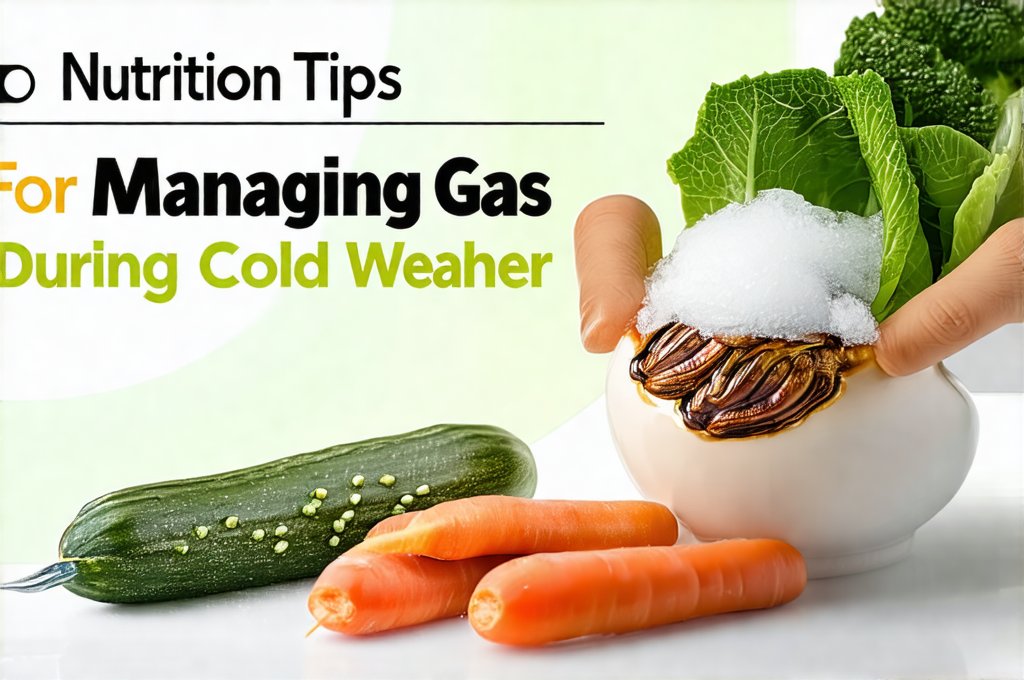The colder months often bring about unwelcome digestive discomfort for many – an increase in bloating, gas, and general tummy troubles. This isn’t necessarily due to a change in our lifestyle, but rather a combination of factors inherent to the season itself. Our bodies work harder to stay warm, digestion can slow down, we tend towards different eating habits (more comfort food!), and decreased physical activity all play a role. Understanding how these elements impact our gut health is the first step toward managing gas effectively during cold weather. It’s crucial to remember that everyone’s digestive system is unique; what triggers gas in one person may not affect another, so personalized adjustments are key.
This article will explore practical nutritional strategies designed to mitigate gas production and promote a more comfortable digestive experience throughout the colder months. We’ll focus on dietary modifications, mindful eating habits, and specific food choices that can help minimize bloating and discomfort without drastically altering your overall diet. The goal isn’t deprivation but rather informed choices that support optimal digestion in challenging seasonal conditions. Ultimately, feeling good physically contributes to a more enjoyable experience of the colder weather – allowing you to embrace cozy moments without digestive distress.
Dietary Adjustments for Cold Weather Gas Management
Cold weather often leads to shifts in our dietary preferences. We crave warmer, heavier foods – soups, stews, baked goods – which are frequently higher in fermentable carbohydrates. These carbs, while comforting, can be a primary source of gas production as they’re broken down by bacteria in the large intestine. Reducing intake isn’t necessarily about eliminating these foods entirely; it’s more about being mindful of portion sizes and balancing them with easily digestible options. Consider focusing on incorporating more warming spices like ginger, turmeric, and cinnamon, which not only add flavor but also possess digestive benefits.
One effective strategy is to gradually increase your fiber intake. A sudden jump in fiber can actually increase gas initially, so it’s important to do this incrementally. Start by adding small amounts of fiber-rich foods – oats, berries, root vegetables – and allow your gut microbiome time to adjust. Drinking plenty of water alongside increased fiber is also essential for smooth digestion. Conversely, be aware that some high-fiber foods are notorious gas producers for many people (beans, broccoli, cabbage). Experiment with smaller portions or different cooking methods (like soaking beans overnight) to see if you can tolerate them better.
Finally, pay attention to your fat intake. While healthy fats are important, excessive amounts – especially during periods of inactivity – can slow down digestion and contribute to bloating. Opt for lean protein sources and moderate portions of healthy fats like avocado, olive oil, and nuts. The key is finding a balance that supports both nutritional needs and digestive comfort. A well-balanced diet tailored to your individual tolerance levels will significantly reduce gas during the colder months. If you’re also concerned about liver health this time of year, consider reading avoiding liver stress.
Understanding FODMAPs & Cold Weather Bloat
FODMAPs – Fermentable Oligosaccharides, Disaccharides, Monosaccharides, And Polyols – are a group of short-chain carbohydrates that can cause digestive issues in susceptible individuals. While not everyone reacts to them, many people experience increased bloating and gas when consuming high-FODMAP foods. Cold weather may exacerbate these sensitivities as digestion slows down, giving FODMAPs more time to ferment in the gut. Common high-FODMAP foods include:
- Apples
- Onions & Garlic
- Wheat products
- Dairy (lactose)
- Legumes (beans and lentils)
Identifying your personal FODMAP triggers can be a game changer. An elimination diet, under the guidance of a healthcare professional, is often used to pinpoint sensitivities. This involves removing high-FODMAP foods for a period, then gradually reintroducing them one at a time to observe any reactions. It’s important not to self-diagnose or restrict your diet unnecessarily; seeking professional advice ensures you’re getting adequate nutrition while identifying problem areas. If you are pregnant and experiencing gallbladder issues, be sure to check out gallbladder disease tips.
The low-FODMAP diet isn’t intended as a long-term solution but rather a tool for identification. Once triggers are identified, modifications can be made to the diet without complete elimination. This might involve reducing portion sizes of trigger foods or finding alternative ingredients with lower FODMAP content. Remember that gut health plays a significant role in FODMAP tolerance; supporting your microbiome through probiotics and prebiotics (foods that feed good bacteria) can also improve digestion. For those struggling with general gut issues during colder weather, gut issues may be helpful to review.
Hydration & Digestive Enzymes
Staying adequately hydrated is fundamental to digestive health, particularly during cold weather when we often don’t feel as thirsty. Water helps move food through the digestive tract efficiently, preventing constipation which can exacerbate gas production. Aim for at least eight glasses of water daily, and consider incorporating herbal teas or warm water with lemon to stay comfortable. Dehydration slows down digestion, allowing more time for fermentation and subsequent gas formation.
Beyond water, digestive enzymes can offer additional support. These naturally occurring substances help break down food into smaller, more easily digestible components. While the body produces its own enzymes, supplementation may be beneficial, particularly when consuming foods that are known to cause gas or during periods of digestive stress. Enzymes specifically designed for breaking down carbohydrates (like lactase for dairy) or legumes can significantly reduce bloating and discomfort.
However, it’s crucial to approach enzyme supplements with caution. They aren’t a substitute for dietary adjustments but rather a complementary tool. Consult with a healthcare professional before starting any new supplement regimen to ensure it’s appropriate for your individual needs and doesn’t interact with any existing medications. Prioritizing hydration and exploring digestive enzyme support can significantly improve digestive comfort during the colder months. If you often struggle with reflux, especially during busy times, review handling reflux strategies.
Mindful Eating Practices for Reduced Gas
Beyond what you eat, how you eat plays a significant role in gas production. Rushing through meals without proper chewing leads to larger food particles entering the digestive system, requiring more effort and potentially leading to incomplete breakdown. This can increase fermentation in the gut and subsequent gas formation. Take your time, savor each bite, and aim for thorough chewing before swallowing.
Avoid eating large portions, especially at night. Overloading the digestive system makes it harder to break down food efficiently, increasing the likelihood of bloating and discomfort. Smaller, more frequent meals are generally easier on the gut. Also, be mindful of combining different foods in a single meal. Some combinations can be particularly challenging for digestion – for example, pairing high-sugar fruits with protein-rich foods.
Finally, minimize distractions during mealtimes. Eating while stressed or preoccupied can disrupt digestive processes and lead to poor food choices. Create a calm and relaxing environment for your meals, focusing on the food itself and enjoying the experience. Practicing mindful eating – slowing down, chewing thoroughly, and minimizing distractions – is a powerful tool for reducing gas and improving overall digestive health. To manage acid levels during intermittent fasting, consider managing acid tips. For those seeking to maintain gallbladder health through lifestyle choices, gallbladder disease and exercise can be helpful. If family gatherings often trigger reflux, review avoiding reflux.


















